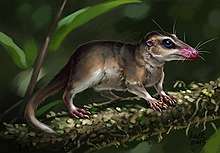| Agilodocodon Temporal range: Callovian ~164.7–161.2 Ma PreꞒ Ꞓ O S D C P T J K Pg N ↓ | |
|---|---|

| |
| Holotype specimen (BMNH 001138) of A. scansorius, National Natural History Museum of China | |
| Scientific classification | |
| Domain: | Eukaryota |
| Kingdom: | Animalia |
| Phylum: | Chordata |
| Clade: | Synapsida |
| Clade: | Therapsida |
| Clade: | Cynodontia |
| Clade: | Mammaliaformes |
| Order: | †Docodonta |
| Genus: | †Agilodocodon Meng et al., 2015 |
| Species: | †A. scansorius |
| Binomial name | |
| †Agilodocodon scansorius Meng et al., 2015 | |
Agilodocodon was a genus of shrew-sized docodont from the Middle Jurassic, believed to be the earliest known tree-climbing mammaliaform. It contains one species, A. scansorius.
Appearance

Agilodocodon measured approximately 13 centimetres (5.1 in) from head to tail, weighing about 27 grams. Its appearance was similar to a squirrel, with a long snout, curved, horny claws and flexible ankle and wrist joints typical of modern arboreal mammals. The front teeth were spade-like, indicating that Agilodocodon could gnaw tree bark and consume gum or sap. Evolutionary biologist Frietson Galis, however, questioned whether Agilodocodon gnawed bark and ate tree sap, saying its teeth "are quite different" from the modern sap-eating primates, and the long, thin lower jaw seems too weak for chomping on tree bark.
Discovery
The fossil of Agilodocodon scansorius, holotype BMNH 001138, along with that of Docofossor brachydactylus, was originally found by farmers in the Chinese Tiaojishan Formation and acquired by the Beijing Museum of Natural History. The type species Agilodocodon scansorius was named and described in the journal Science in 2015. The generic name refers to the membership of the Docodonta and the agility. The specific name refers to the scansorial lifestyle.
References
- ^ Qing-Jin Meng; Qiang Ji; Yu-Guang Zhang; Di Liu; David M. Grossnickle; Zhe-Xi Luo (2015). "An arboreal docodont from the Jurassic and mammaliaform ecological diversification". Science. 347 (6223): 764–768. Bibcode:2015Sci...347..764M. doi:10.1126/science.1260879. PMID 25678661. S2CID 206562565.
- ^ Michael Balter (12 Feb 2015). "Found: Two sophisticated mammals that thrived during the age of the dinosaurs". Science. Retrieved 13 Feb 2015.
| Taxon identifiers | |
|---|---|
| Agilodocodon scansorius | |
This cynodont-related article is a stub. You can help Misplaced Pages by expanding it. |





